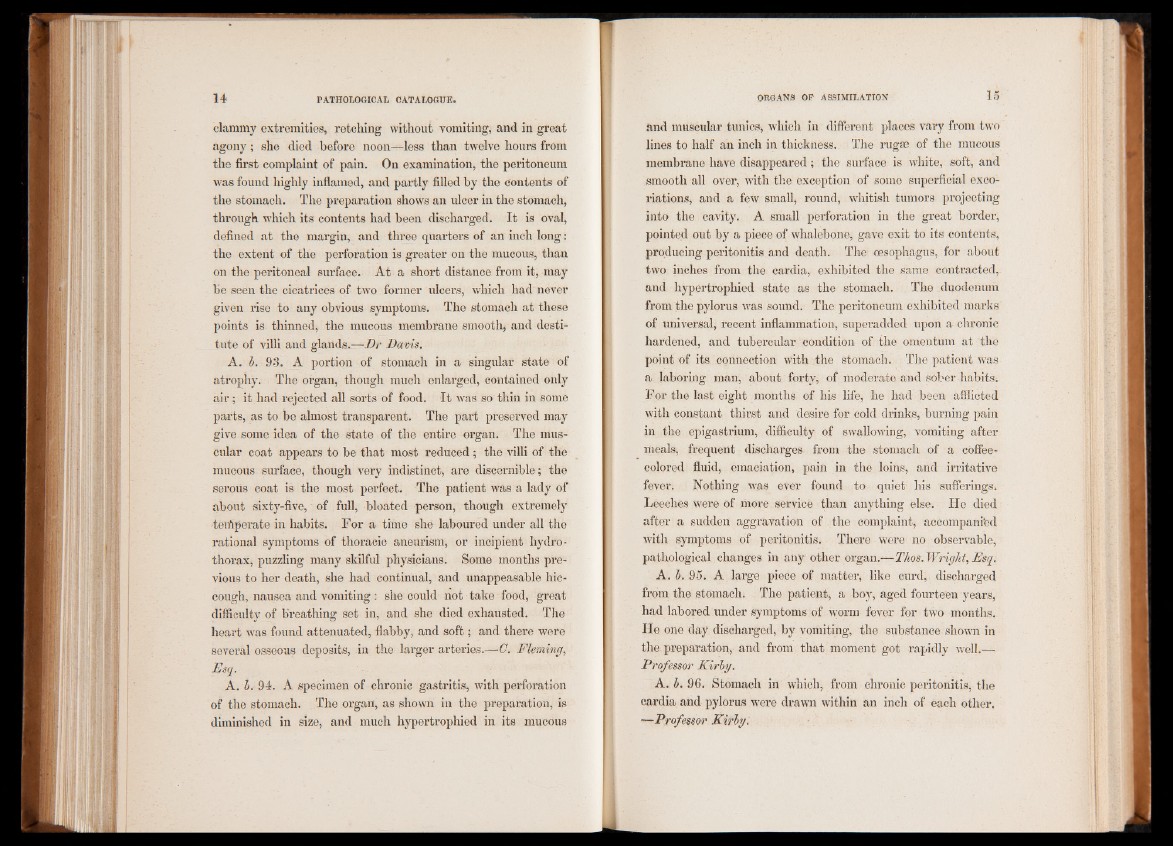
clammy extremities, retching without vomiting, and in great
agony; she died before noon—less than twelve hours from
the first complaint of pain. On examination, the peritoneum
was found highly inflamed, and partly filled by the contents of
the stomach. The preparation shows an ulcer in the stomach,
through which its contents had been discharged. It is oval,
defined at the margin, and three quarters of an inch long:
the extent of the perforation is greater on the mucous, than
on the peritoneal surface. At a short distance from it, may
be seen the cicatrices of two former ulcers, which had never
given rise to any obvious symptoms. The stomach at these
points is thinned, the mucous membrane smooth, and destitute
of villi and glands.—Dr Davis.
A. b. 93. A portion of stomach in a singular state of
atrophy. The organ, though much enlarged, contained only
air; it had rejected all sorts of food. It was so thin in some
parts, as to be almost transparent. The part preserved may
give some idea of the state of the entire organ. The muscular
coat appears to be that most reduced; the villi of the
mucous surface, though very indistinct, are discernible; the
serous coat is the most perfect. The patient was a lady of
about sixty-five, of full, bloated person, though extremely
temperate in habits. For a time she laboured under all the
rational symptoms of thoracic aneurism, or incipient hydrothorax,
puzzling many skilful physicians. Some months previous
to her death, she had continual, and unappeasable hiccough,
nausea and vomiting : she could not take food, great
difficulty of breathing set in, and she died exhausted. The
heart was found attenuated, flabby, and soft; and there were
several osseous deposits, in the larger arteries.—0. Fleming,
Esq.
A. b. 94. A specimen of chronic gastritis, with perforation
of the stomach. The organ, as shown in the preparation, is
diminished in size, and much hypertrophied in its mucous
and muscular tunics, which in different places vary from two
lines to half an inch in thickness. The rugae of the mucous
membrane have disappeared; the surface is white, soft, and
smooth all over, with the exception of some superficial excoriations,
and a few small, round, whitish tumors projecting
into the cavity. A small perforation in the great border,
pointed out by a piece of whalebone, gave exit to its contents,
producing peritonitis and death. The oesophagus, for about
two inches from the cardia, exhibited the same contracted,,
and hypertrophied state as the stomach. The duodenum
from the pylorus was sound. The peritoneum exhibited marks
of universal, recent inflammation, superadded upon a chronic
hardened, and tubercular condition of the omentum at the
point of its connection with the stomach. The patient was
a. laboring man, about forty, of moderate and sober habits;
For the last eight months of his life, he had been afflicted
with constant thirst and desire for cold drinks, burning pain
in the epigastrium, difficulty of swallowing, vomiting after
meals, frequent discharges from the stomach of a coffee-
colored fluid, emaciation, pain in the loins, and irritative
fever. "Nothing was ever found to quiet his sufferings.
Leeches were of more service than anything else. He died
after a sudden aggravation of the complaint, accompanied
with symptoms of peritonitis. There were no observable,
pathological changes in any other organ.—Thos. Wright, Esq.
A. b. 95. A large piece of matter, like curd, discharged
from the stomach. The patient, a boy, aged fourteen years,
had labored under symptoms of worm fever for two months.
He one day discharged, by vomiting, the substance shown in
the preparation, and from that moment got rapidly well.—
Professor Kirby.
A. b. 96. Stomach in which, from chronic peritonitis, the
cardia and pylorus were drawn within an inch of each other.
—Professor Kirby.